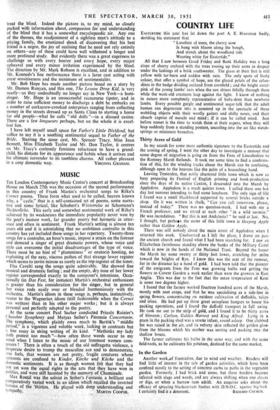MUSIC
THE London Contemporary Music Centre's concert at Broadcasting House on March 27th was the occasion of the second performance in this country of Frank Martin's orchestral songs to Rilke's Cornet poems. These form what used to be called, heaven knows why, a " cycle," that is a self-contained set of poems, some narra- tive and some lyrical, like Schubert's Winterreise or Schumann's nichterliebe. This early and somewhat sentimental work of Rilke's achieved by its weaknesses the immediate popularity never won by the poet's mature work, far grander poetry but hermetic in utter- ance and often in sentiment. Frank Martin's setting is almost ten years old and it is astonishing that no ambitious contralto in this country has yet included these songs in her repertory. Twenty-three songs for a contralto, an hour's music, impose a strain on the listener and demand a singer of great dramatic powers, whose voice and style can overcome the initial disadvantages of the type of voice. There must be no hint of " plumminess " or oratorio hooting, no exploiting of the easy, viscous pathos of that strange lower register which seems to invite misuse as surely as the top register of the tenor. Elsa Cavelti sang the songs quite admirably. She showed fine musical and dramatic feeling ; and the empty, dry tone of her lower register corresponded exactly to the composer's intentions. Occa- sionally (in Das Fest, for instance) Martin's orchestral enthusiasm is greater than his consideration for the singer, but in general her voice rode easily over or blended harmoniously with the orchestra. Martin's idiom in these songs is, perhaps, instinctively, nearer to the Wagnerian idiom (still fashionable when the Cornet was written) than in his other major works ; but it is always personal and perfectly adapted to the poetry. At the same concert Paul Sacher conducted Priaulx Rainier's Chamher Symphony and Matyas Seiber's Fantasia Concertante. The symphony, which plainly owes much to Bartbk's " middle period," is a vigorous and voluble work, lacking in contrasts but a fine essay in string writing of its kind. " Methinks my. lady loth protest too much "—how often those words occur to my mind when I listen to the music of our foremost women com- posers ! There is often a touch of the old suffragette violence, a desperate desire to trump the masculine ace and to demonstrate, one feels, that women are not pretty, fragile creatures whose interests are confined to Kinder, Kirche and Kiiche and the domestic sentiments. It is as though women felt that they had not yet won the equal rights in the arts that they have won in politics, and were still haunted by the memory of Chaminade. Max Rostal was the soloist in Seiber's Fantasia. a brilliant and C. omparatively varied work in an idiom which recalled the inverted heroics of the 'thirties. He played with deep understanding and






























 Previous page
Previous page